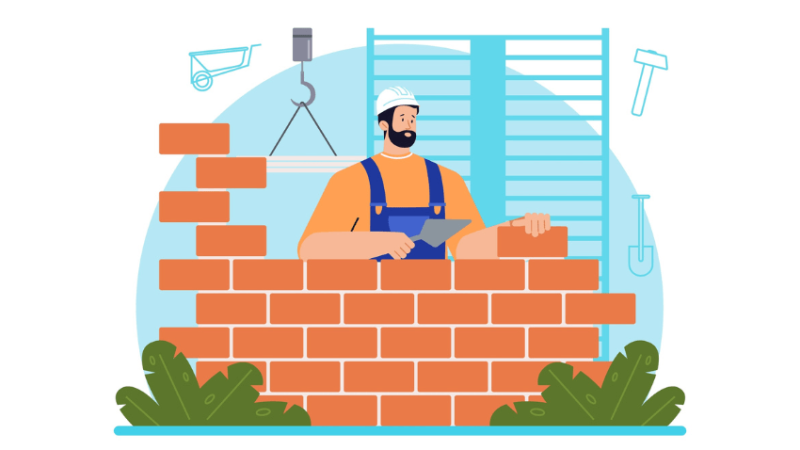The impact of high-stakes testing on teaching and learning - teacher survey

In February 2018, we asked 436 teachers about how high-stakes testing affects the quality of their lessons and their enthusiasm for teaching. Here are the results in full. 16. Greater control of the content and delivery of my lessons would encourage me to remain in the teaching profession. 15. Greater autonomy at work would improve […]

- by Teachwire
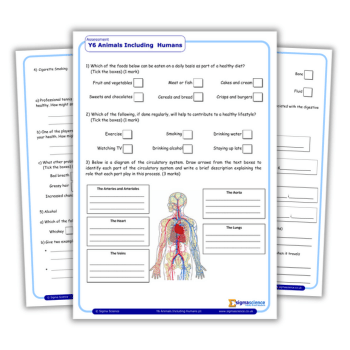
In February 2018, we asked 436 teachers about how high-stakes testing affects the quality of their lessons and their enthusiasm for teaching. Here are the results in full.
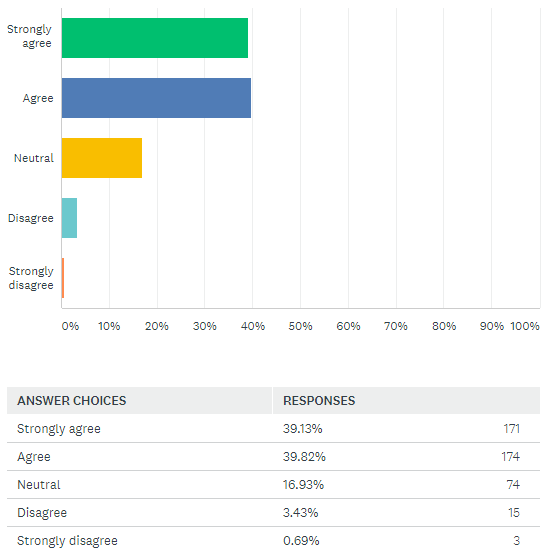
16. Greater control of the content and delivery of my lessons would encourage me to remain in the teaching profession.
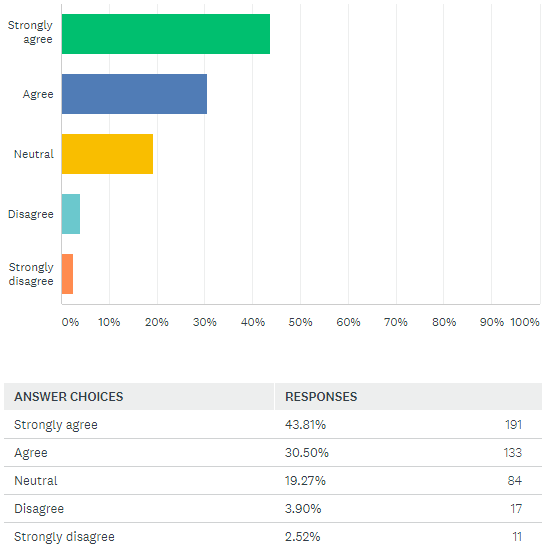
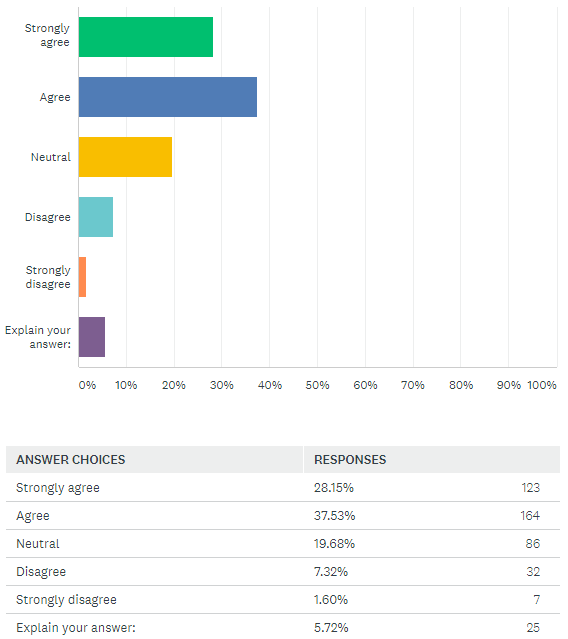
15. Greater autonomy at work would improve the quality of my teaching.

16. Greater control of the content and delivery of my lessons would encourage me to remain in the teaching profession.

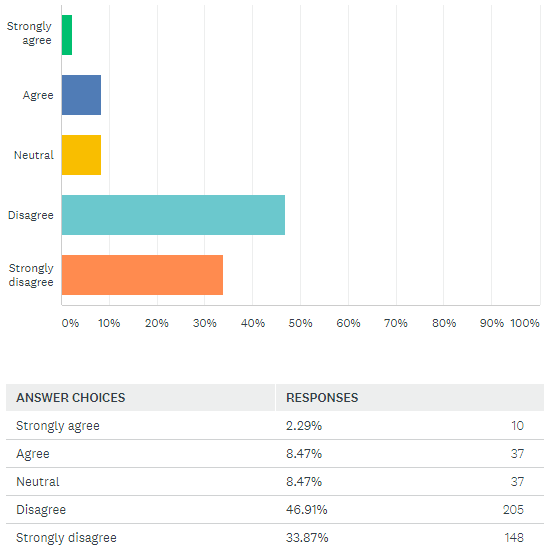
14. Greater autonomy at work would reduce my workload.

15. Greater autonomy at work would improve the quality of my teaching.

16. Greater control of the content and delivery of my lessons would encourage me to remain in the teaching profession.

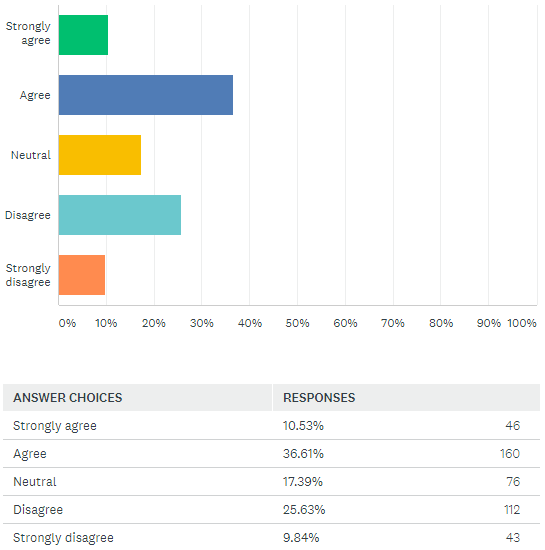
13. I have adequate time to expand on the programmes of study in order to follow children’s learning interests.

14. Greater autonomy at work would reduce my workload.

15. Greater autonomy at work would improve the quality of my teaching.

16. Greater control of the content and delivery of my lessons would encourage me to remain in the teaching profession.

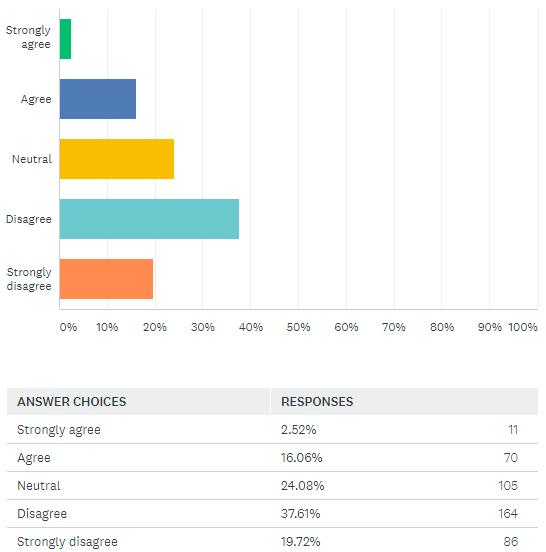
12. I am free to choose which pedagogical approaches to use when it comes to delivering the curriculum in my classroom.

13. I have adequate time to expand on the programmes of study in order to follow children’s learning interests.

14. Greater autonomy at work would reduce my workload.

15. Greater autonomy at work would improve the quality of my teaching.

16. Greater control of the content and delivery of my lessons would encourage me to remain in the teaching profession.

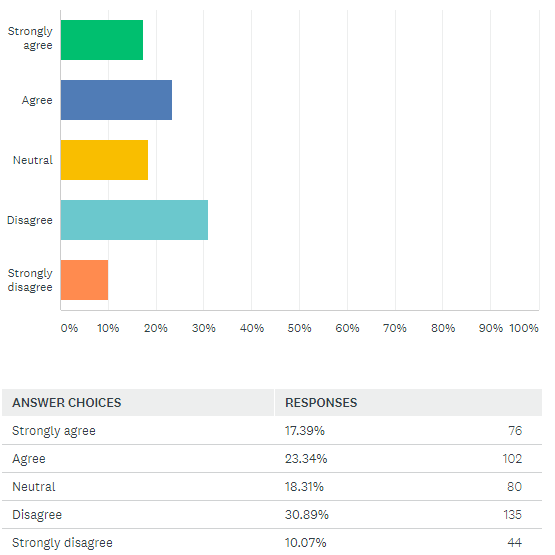
11. Regular lesson observations (internal) help to improve the quality of my teaching.

12. I am free to choose which pedagogical approaches to use when it comes to delivering the curriculum in my classroom.

13. I have adequate time to expand on the programmes of study in order to follow children’s learning interests.

14. Greater autonomy at work would reduce my workload.

15. Greater autonomy at work would improve the quality of my teaching.

16. Greater control of the content and delivery of my lessons would encourage me to remain in the teaching profession.

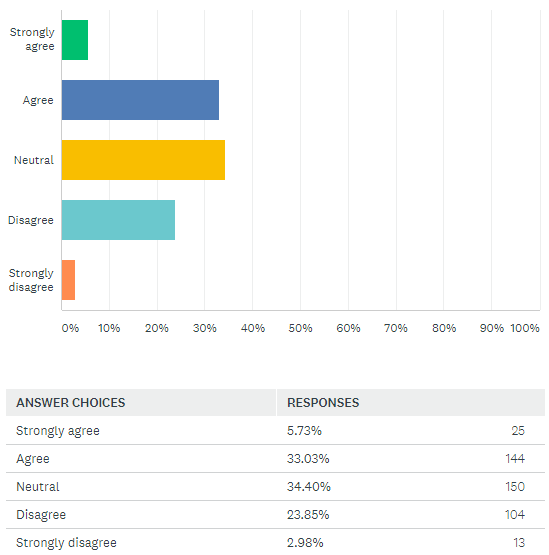
10. The way in which I plan lessons is closely monitored

11. Regular lesson observations (internal) help to improve the quality of my teaching.

12. I am free to choose which pedagogical approaches to use when it comes to delivering the curriculum in my classroom.

13. I have adequate time to expand on the programmes of study in order to follow children’s learning interests.

14. Greater autonomy at work would reduce my workload.

15. Greater autonomy at work would improve the quality of my teaching.

16. Greater control of the content and delivery of my lessons would encourage me to remain in the teaching profession.

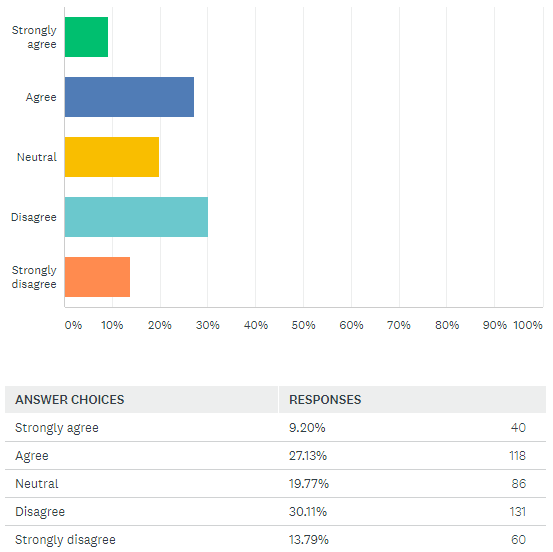
9. I regularly feel excited by the content of the lessons I teach.

10. The way in which I plan lessons is closely monitored

11. Regular lesson observations (internal) help to improve the quality of my teaching.

12. I am free to choose which pedagogical approaches to use when it comes to delivering the curriculum in my classroom.

13. I have adequate time to expand on the programmes of study in order to follow children’s learning interests.

14. Greater autonomy at work would reduce my workload.

15. Greater autonomy at work would improve the quality of my teaching.

16. Greater control of the content and delivery of my lessons would encourage me to remain in the teaching profession.

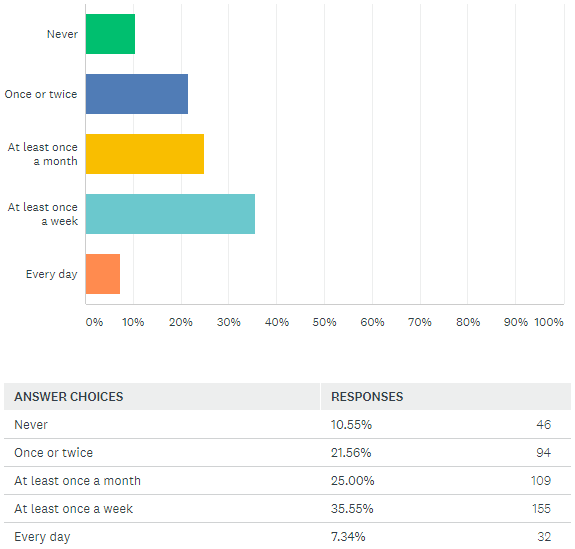
8. My expertise as an education professional is respected and I have the freedom to apply my expertise in the classroom.

9. I regularly feel excited by the content of the lessons I teach.

10. The way in which I plan lessons is closely monitored

11. Regular lesson observations (internal) help to improve the quality of my teaching.

12. I am free to choose which pedagogical approaches to use when it comes to delivering the curriculum in my classroom.

13. I have adequate time to expand on the programmes of study in order to follow children’s learning interests.

14. Greater autonomy at work would reduce my workload.

15. Greater autonomy at work would improve the quality of my teaching.

16. Greater control of the content and delivery of my lessons would encourage me to remain in the teaching profession.

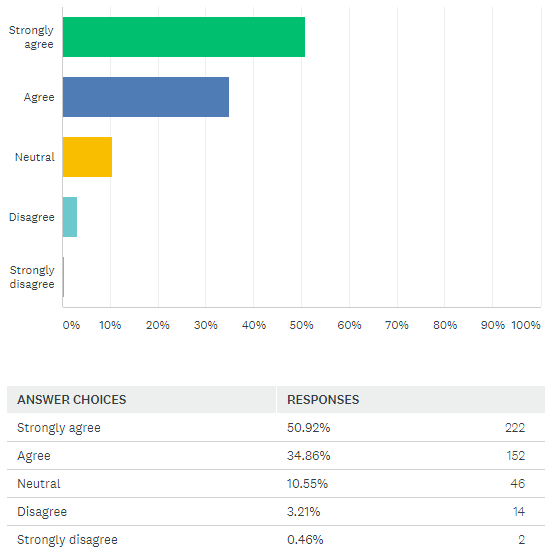
7. In the past year, how often, if at all, have you taught a lesson you thought to be of little educational value in order to increase children’s chances of passing national tests?

8. My expertise as an education professional is respected and I have the freedom to apply my expertise in the classroom.

9. I regularly feel excited by the content of the lessons I teach.

10. The way in which I plan lessons is closely monitored

11. Regular lesson observations (internal) help to improve the quality of my teaching.

12. I am free to choose which pedagogical approaches to use when it comes to delivering the curriculum in my classroom.

13. I have adequate time to expand on the programmes of study in order to follow children’s learning interests.

14. Greater autonomy at work would reduce my workload.

15. Greater autonomy at work would improve the quality of my teaching.

16. Greater control of the content and delivery of my lessons would encourage me to remain in the teaching profession.

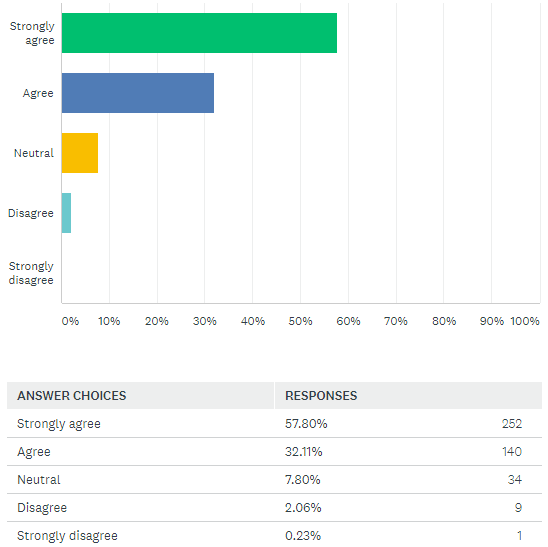
6. The removal of high-stakes testing would improve the quality of my students’ education.

7. In the past year, how often, if at all, have you taught a lesson you thought to be of little educational value in order to increase children’s chances of passing national tests?

8. My expertise as an education professional is respected and I have the freedom to apply my expertise in the classroom.

9. I regularly feel excited by the content of the lessons I teach.

10. The way in which I plan lessons is closely monitored

11. Regular lesson observations (internal) help to improve the quality of my teaching.

12. I am free to choose which pedagogical approaches to use when it comes to delivering the curriculum in my classroom.

13. I have adequate time to expand on the programmes of study in order to follow children’s learning interests.

14. Greater autonomy at work would reduce my workload.

15. Greater autonomy at work would improve the quality of my teaching.

16. Greater control of the content and delivery of my lessons would encourage me to remain in the teaching profession.

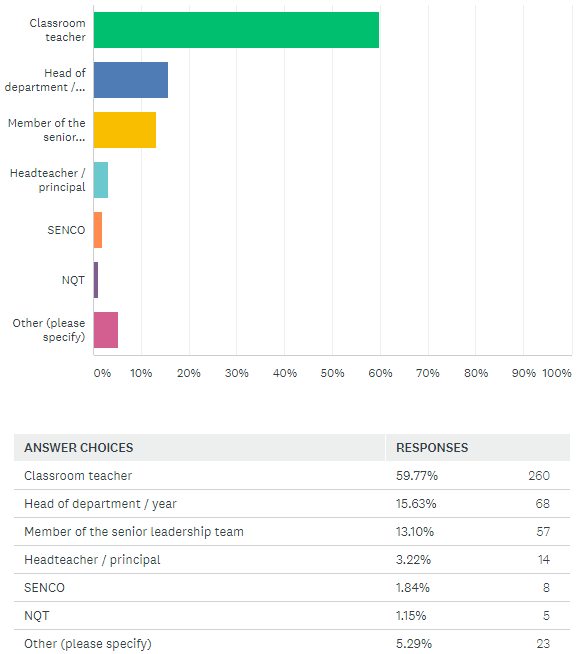
5. The removal of high-stakes testing would allow me to teach more interesting lessons.

6. The removal of high-stakes testing would improve the quality of my students’ education.

7. In the past year, how often, if at all, have you taught a lesson you thought to be of little educational value in order to increase children’s chances of passing national tests?

8. My expertise as an education professional is respected and I have the freedom to apply my expertise in the classroom.

9. I regularly feel excited by the content of the lessons I teach.

10. The way in which I plan lessons is closely monitored

11. Regular lesson observations (internal) help to improve the quality of my teaching.

12. I am free to choose which pedagogical approaches to use when it comes to delivering the curriculum in my classroom.

13. I have adequate time to expand on the programmes of study in order to follow children’s learning interests.

14. Greater autonomy at work would reduce my workload.

15. Greater autonomy at work would improve the quality of my teaching.

16. Greater control of the content and delivery of my lessons would encourage me to remain in the teaching profession.

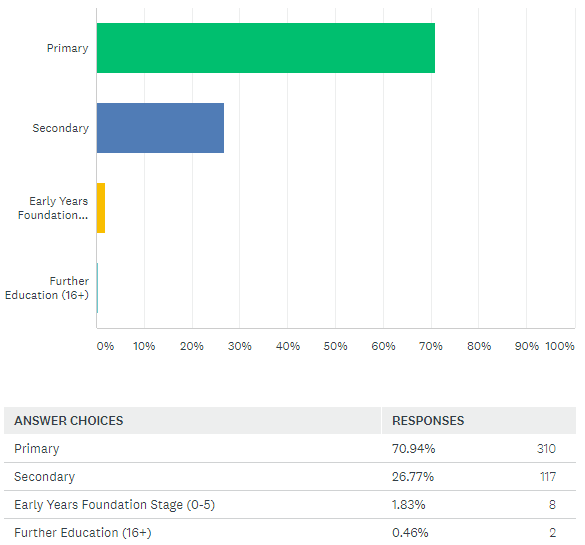
4. What is your role?

5. The removal of high-stakes testing would allow me to teach more interesting lessons.

6. The removal of high-stakes testing would improve the quality of my students’ education.

7. In the past year, how often, if at all, have you taught a lesson you thought to be of little educational value in order to increase children’s chances of passing national tests?

8. My expertise as an education professional is respected and I have the freedom to apply my expertise in the classroom.

9. I regularly feel excited by the content of the lessons I teach.

10. The way in which I plan lessons is closely monitored

11. Regular lesson observations (internal) help to improve the quality of my teaching.

12. I am free to choose which pedagogical approaches to use when it comes to delivering the curriculum in my classroom.

13. I have adequate time to expand on the programmes of study in order to follow children’s learning interests.

14. Greater autonomy at work would reduce my workload.

15. Greater autonomy at work would improve the quality of my teaching.

16. Greater control of the content and delivery of my lessons would encourage me to remain in the teaching profession.


3. In which sector of education are you employed?

4. What is your role?

5. The removal of high-stakes testing would allow me to teach more interesting lessons.

6. The removal of high-stakes testing would improve the quality of my students’ education.

7. In the past year, how often, if at all, have you taught a lesson you thought to be of little educational value in order to increase children’s chances of passing national tests?

8. My expertise as an education professional is respected and I have the freedom to apply my expertise in the classroom.

9. I regularly feel excited by the content of the lessons I teach.

10. The way in which I plan lessons is closely monitored

11. Regular lesson observations (internal) help to improve the quality of my teaching.

12. I am free to choose which pedagogical approaches to use when it comes to delivering the curriculum in my classroom.

13. I have adequate time to expand on the programmes of study in order to follow children’s learning interests.

14. Greater autonomy at work would reduce my workload.

15. Greater autonomy at work would improve the quality of my teaching.

16. Greater control of the content and delivery of my lessons would encourage me to remain in the teaching profession.


2. In what type of school do you work?

3. In which sector of education are you employed?

4. What is your role?

5. The removal of high-stakes testing would allow me to teach more interesting lessons.

6. The removal of high-stakes testing would improve the quality of my students’ education.

7. In the past year, how often, if at all, have you taught a lesson you thought to be of little educational value in order to increase children’s chances of passing national tests?

8. My expertise as an education professional is respected and I have the freedom to apply my expertise in the classroom.

9. I regularly feel excited by the content of the lessons I teach.

10. The way in which I plan lessons is closely monitored

11. Regular lesson observations (internal) help to improve the quality of my teaching.

12. I am free to choose which pedagogical approaches to use when it comes to delivering the curriculum in my classroom.

13. I have adequate time to expand on the programmes of study in order to follow children’s learning interests.

14. Greater autonomy at work would reduce my workload.

15. Greater autonomy at work would improve the quality of my teaching.

16. Greater control of the content and delivery of my lessons would encourage me to remain in the teaching profession.

1. In which country do you work?

2. In what type of school do you work?

3. In which sector of education are you employed?

4. What is your role?

5. The removal of high-stakes testing would allow me to teach more interesting lessons.

6. The removal of high-stakes testing would improve the quality of my students’ education.

7. In the past year, how often, if at all, have you taught a lesson you thought to be of little educational value in order to increase children’s chances of passing national tests?

8. My expertise as an education professional is respected and I have the freedom to apply my expertise in the classroom.

9. I regularly feel excited by the content of the lessons I teach.

10. The way in which I plan lessons is closely monitored

11. Regular lesson observations (internal) help to improve the quality of my teaching.

12. I am free to choose which pedagogical approaches to use when it comes to delivering the curriculum in my classroom.

13. I have adequate time to expand on the programmes of study in order to follow children’s learning interests.

14. Greater autonomy at work would reduce my workload.

15. Greater autonomy at work would improve the quality of my teaching.

16. Greater control of the content and delivery of my lessons would encourage me to remain in the teaching profession.










